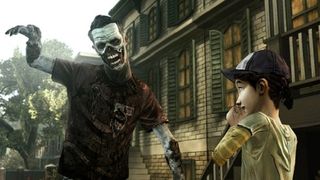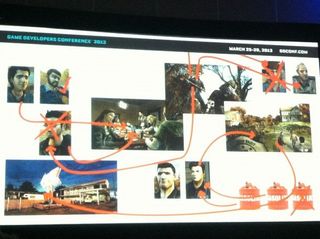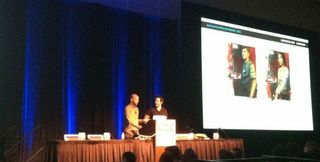GDC 2013: Clementine was almost cut from The Walking Dead, Telltale on the dangers of branching a story too much

At Telltale's panel " Saving Doug: Empathy, Character, and Choice in The Walking Dead " today at GDC 2013 , co-creative leads Jake Rodkin and Sean Vanaman outlined the ideas that guided their design of one of last year's most acclaimed games. A few of the presentation's topics overlapped a little with DayZ creator Dean Hall's comments yesterday at GDC about the value of context in storytelling and of player-generated meaning. But maybe most notably, the pair of designers admitted that they were concerned "every day" about how the game's story would suffer if players didn't care about Clementine, Lee's companion throughout the series.
Hopefully Obvious Disclaimer: This post includes spoilers about Telltale's adaptation of The Walking Dead.
Jake Rodkin: “While Clementine seems like an obvious choice for a character in a game that's paying attention to your decisions because she can both influence your decisions and she can be shaped by them, but the creation for Clementine was actually more pragmatic at the beginning. It came from us trying to answer one question, which is: 'Why the hell would you not leave this group of ass*$#%?' So we quickly realized that a child that you cared about, someone akin to Carl in terms of Rick from the comics, would mean that you couldn't just hit the road or maybe you wouldn't constantly feel like you wanted to. But of course, if you don't care about that child as well, then we were sort of doubly screwed. Because you'd be frustrated with this group and you'd be shackled to this little kid you don't care about.”
Sean Vanaman: "Those were real fears. That was like real, every day..."
Rodkin: "Was there talk about cutting Clementine out of the game a week before voice recording? Yes there was."

Earlier in the presentation Rodkin and Vanaman explained how Telltale came to recognize that adding too many story branches was a potential pitfall.
Rodkin: “We had to learn in The Walking Dead that the setup leading up to a dramatic moment was going to be as important or maybe more important than the payoffs. It did take us a while to get there. I think with the idea of an interactive story it's really, really easy to get fixated on branching the narrative just for the sake of having more branches. You can spend forever coming up with cool ways to branch a story and lose sight of what makes the choices that you're branching have resonance in the first place, which is the context that's built up before the choice is made--the reason that a player is actually making a choice. It turns out that you can branch your narrative all you want, and that doesn't make your narrative any more meaningful if the act of actually making those choices have no meaning.”
The biggest gaming news, reviews and hardware deals
Keep up to date with the most important stories and the best deals, as picked by the PC Gamer team.
Vanaman: “Something we learned the hard way.”
Rodkin: “Yes. So, for example... for a while we actually altered the design of the second episode of The Walking Dead so that the result of most every major plot beat in the first act was in the hands of the player at the expense of building context. Every big event had repercussions which rippled out into later in the episode.”
Continuing, Rodkin provided an example of a plot structure they were considering for the game's second episode, but eventually discarded.
Rodkin: “So like, for instance, when you encounter these guys David and Travis in the woods, one of them would come back to you, and one of them would be left behind to become food for the cannibals later in the episode. But maybe if you made a completely unrelated choice later, Mark would be the one who was eaten instead. So Lee has this axe which you can give to a few different characters, only some of them could come to your aid later on. And then when the family from the dairy meets you, you could decide how much of your group's fuel store to put on the table to bargain with in exchange for food when you go to visit them in the dairy. Then when you finally do get to the dairy, if you don't like it there, you could just take your whole camp back for a second hash-through of all your options. Which of course, practically ended up boiling down to just 'Oh, we should actually just go back to that dairy.'”

Rodkin: “It sounds maybe cool on paper until you say all of that out loud. And maybe in another game or another situation it would be incredibly cool, but in The Walking Dead it wasn't working. We were selling out the reason that all these choices were important for just giving the player the ability to make more choices. Creating all of these events and feeling like you had all this power actually ended up robbing all of the events of their meaning.”
Vanaman: “Yeah, we forgot about context and kind of became slaves to the question of 'Wouldn't it be neat if?'”
Rodkin: “Yeah, the more we broke the game down into choice after choice after choice, creating a sort of ever-shifting foundation of context to build on, the more players in playtests and even just the team started to feel untethered from the meaning of things, from what they were doing. And it drove home for us what really mattered in The Walking Dead, which was the experience of spending time with the world and the characters until you knew them the way you would a real place and real people, and then putting those bonds to the test.”
Track down the rest of the presentation on the GDC Vault when it becomes available. Rodkin and Vanaman can also be heard on the wonderful Idle Thumbs podcast.

Evan's a hardcore FPS enthusiast who joined PC Gamer in 2008. After an era spent publishing reviews, news, and cover features, he now oversees editorial operations for PC Gamer worldwide, including setting policy, training, and editing stories written by the wider team. His most-played FPSes are CS:GO, Team Fortress 2, Team Fortress Classic, Rainbow Six Siege, and Arma 2. His first multiplayer FPS was Quake 2, played on serial LAN in his uncle's basement, the ideal conditions for instilling a lifelong fondness for fragging. Evan also leads production of the PC Gaming Show, the annual E3 showcase event dedicated to PC gaming.
Most Popular







